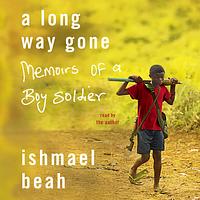Take a photo of a barcode or cover
The first part of the book moved a little slower than I thought it was going to. But after reading the entire book, I realized that it was important. The boy soldier portion of the book was shorter than I thought, but it was revisited when he was living in the rehabilitation facility and with his family in Freetown. He had moments when the memories would come flooding back. I had remind myself many times that he was a child when these experiences happened. It's amazing how much Ishmael Beah has overcome and due to these experiences he is where he is doing what he does.
The book is incredible well-written. The innocence of being a child is balanced with the savage acts of war. I definitely recommend this book.
 On the surface, this is a story about a horrible childhood. A young boy is forced to be a warfighter and held captive by drug addition. The author's agenda was to convey the atrocities of forcing children to wage war with mostly small arms and knives.
On the surface, this is a story about a horrible childhood. A young boy is forced to be a warfighter and held captive by drug addition. The author's agenda was to convey the atrocities of forcing children to wage war with mostly small arms and knives. There are many reasons to be suspicious, however, that you are reading an accurate, first-hand account. Not every eyewitness account is accurate. Some of the events do not seem realistic. (Would a baby's body stop the bullet from an AK or G3?) Perhaps in anticipation of such suspicions, the author lays the ground work early by stating that he has a near photographic memory. Later, he recalls how he and others are put off at a peer, also from their story-telling culture, who embellishes a tale by adding his own twist. Would my cousin Vinny would tear this apart? Maybe, maybe not.
Unfortunately, most middle schoolers reading this won't doubt a word of it. But at least they are exposed to some realities of war. Hash tags, carbon credits, and more economic opportunities are not what wins wars. The horrible reality is that killing people and destroying things are what wins wars. Collateral damage is what make countries surrender.
Many reviews mention how hard this book is to read and how sad they feel that this happens. This is understandable, as this is the most graphically violent book i have read, and moreover it is a memoir so it holds extra weight. What's missing is discussion of Beah's remarkable ability to tell such a harrowing, tragic painful story in such a clear, compelling way in which you as a reader, though horrified, connect with Ishmael the character and agree to trust him and go on this journey. Beah's writing is often beautiful and ominous. It is hard to imagine surviving what he did, and even harder to I aging writing a story as good as this one.
This story is certainly a Dantesque descent into hell, and the pain of rehabilitation and the striking compassion and humanity and self-sacrifice of those who worked to give new life to the child soldiers is one of the most emotionally wrought parts of the book. When I began this book, I expected even more of this part of the story, and wanted to know more about the path to becoming a human after such inhuman experiences, but the book ends somewhat abruptly.
One of the aspects of this book that I connected with most is Beah's love of music. Through the first half of his journey before he becomes a soldier, he carries one of his prized possessions with him: a cassette tape of Naughty by Nature. Music plays a part in his rehabilitation, too, and is the only way that a woman trying to help him can make that first connection and begin to gain his trust. Because music is so tied to how we understand time, this really drove home for me that Beah and I are pretty much the same age and all of this was going on across the globe while I was plodding through junior high and high school. In Beah's story, I was reminded of the extreme power of music to help us connect with others, to give us food for our souls, and to help us heal.






